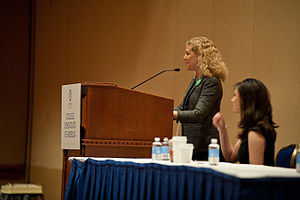Protesters outside the Wisconsin Statehouse,
Madison, WI, Feb. 26, 2011.
(Photo by Richard Hurd, via Creative Commons)
A new poll conducted last week shows Gov. Scott Walker (R-WI) with a seven point lead over Milwaukee Mayor Tom Barrett in next Tuesday's recall election, in Wisconsin. Contemplating a negative outcome after all the protests, all the statehouse sleepovers, all the nights the Democrats of the Wisconsin Senate hid out in an Illinois motel, all the visits from Ed Schultz and the rest of the national media, all the signatures on recall petitions, it all sucks, of course. Big time. But the herculean effort it took to try and oust the union busting governor of the first state where public employee unions were recognized is worth more than just an "Oh well, we tried," and an "atta boy" for the recall movement's strident activists. It deserves to be recognized for initiating a conversation on fairness, and bringing ownership and unity to a movement.
First, if one were to follow the fuse that exploded in Zuccotti Park, last fall, to its source, they would find an unwound reel and depressed plunger in the rotunda of the statehouse in Madison. Occupy Wall Street could not have happened without it. No matter what happens Tuesday, the conversation about fairness - fairness for the middle class and for union workers - is not over. What began in Madison was amplified by mic checks in Lower Manhattan that continue to echo across the country. The chorus is just beginning, even appearing as a central theme of Obama's reelection campaign.
"The job of a President is to lay the foundation for strong and sustainable broad-based growth," Obama said at a campaign stop in Iowa last week, "It’s to make sure that everybody in this country gets a fair shake, everybody gets a fair shot, everybody is playing by the same set of rules.
"When you’re the President," he added, with rhetoric intended to distinguish himself from the GOP nominee, corporate raider Mitt Romney, "your job is to look out for the investor and the worker; for the big companies and the small companies; for the health of farmers and small businesspeople and the nurse and the teacher. You're supposed to be thinking about everybody -- and the health of the middle class, and what the future is going to hold for our kids."
Obama took on economic fairness directly because he saw there was support out there. Politicians don't adopt an agenda just to be "radical." Sure it helps if it's in their philosophical wheelhouse, but they do it because they have political cover. They see there is a thriving movement that will support it. And if voices support it, and they get lots of media time, the money will follow. Just ask the Tea Party.
Second, what Wisconsin re-affirms is that this is our country. No matter how much money the Koch Brothers and Karl Rove and Sheldon Adelson throw at a politician's feet, our voices and our actions are the weapons they fear most. Otherwise, they wouldn't be working so hard to disenfranchise us at the voting booth.
Lastly, what happened in Madison united us. It brought liberal and progressive activists together with establishment organizations like major unions, the ACLU and Planned Parenthood, in a fight that Rebuild the Dream founder Van Jones might call "class warfare… against people who have no class." Indeed, it's likely that the Susan G. Komen, anti-Planned Parenthood blow-back, this past March, would not have happened without the unity with which we have empowered ourselves since February, 2011.
Remember that no matter what happens in the Battle for Wisconsin, on June 5, there will be no flag of surrender, from either side. For those of us committed to fairness, equality and the right of everyone to be healthy and prosperous, the fight never ends. There's always someone who wants to turn back the clock on women, sacrifice the welfare of workers and suppress the rights of voters. We have to be there every time. They only win when we allow ourselves to lose, and that will never happen.
-PBG
Related articles
- Labor Falters in Wisconsin (thedailybeast.com)
- The defining reason behind Scott Walker's recall election - Milwaukee Political Buzz | Examiner.com (mbcalyn.com)
- Esquire:Scott Walker Doesn't Like Him No Rules (esquire.com)





